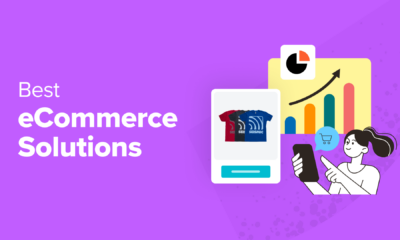SOCIAL
These Simple Design Tweaks Can Boost Your Website Sales

The following is an excerpt from Content Is King: The Complete Guide to Writing Website Content That Sells by Laura Briggs, available now at Entrepreneur Bookstore, Amazon, Barnes & Noble and Bookshop.
While your website will always contain some unique elements from your industry, most websites include similar types of content. Knowing which ones are most relevant for your needs will help you create a roadmap for your site. Each website page should function well on its own and as part of the site as a whole. Here are brief introductions to the kinds of content you’re most likely to need.
Home Page
General length: flexible
In terms of content, your home page is very flexible. You can include lots of graphics, photos, and videos if that will help your ideal audience to interact with you and your site more effectively. For the purposes of search engines, however, it’s a good idea to have some base text on your home page that explains who you are, what you do, and who you do that for, so a person finding your site can easily and quickly decide if they’re in the right place.
Your home page is the place where you have the best chance to make an impression with your brand. You’ll combine the visual aspects of your site design with text to share your company’s story and positioning.
Related: Ultimate Guide to Using Shopify
Review and update your home page twice a year. Many companies use rotating versions of their home page, so different visitors receive different versions of the site. Doing this can provide you with helpful information and data about which messages resonate best with your audience, which allows you to eliminate underperformers. Sometimes varying home pages can provide a better user experience overall, when someone is navigating back to the home page again and again. Having a few different versions of your home page that are continually updated and evaluated can have big impacts.
And don’t overlook small opportunities to increase your conversions to email newsletter sign-ups. You can make changes as small as swapping out one word in that sign-up text or tweaking the background color of the button. Internet marketing and content marketing are all about making and then testing hypotheses. Those results will drive any changes or updates to your material.
About Page
General length: 300 to 600 words
One of the best places to showcase personality on your website is your About page. This is where you fuse your industry background with some of your personal interests, hobbies, and approaches to business. If you only have a few members on your team, your About page might include a biography for each of them, or it could speak from a big-picture perspective about why you started the company and the missions and values that drive your business today.
Allow your company’s individualism to shine through in an About page. If you take a nontraditional approach to doing business or if you’ve racked up numerous industry awards, the About page is the place to list this.
Related: Ultimate Guide to Social Media Marketing
Here are some questions to help you jump-start the process of drafting an About page:
- Whom do we help? What is their primary crisis or need when they call or hire us?
- Why did our founders start this business? How has the company evolved since then?
- How long have individual team members or the entire company been in business?
- What makes our company different from our competitors?
- Have we received any special distinctions or honors, such as specific awards, industry recognition from organizations or conferences, or exceptional customer feedback and testimonials?
- Are there any unique aspects of our company culture or values that we want our customers to know?
Services Pages: For Service-Based Companies Only
General length: 500+ words
Services pages are where you get to provide more information about the core services your business offers. Properly leveraging services pages accomplishes a few goals. First, these pages highlight your knowledge of individual services, confirming that you can help with your readers’ specific concerns. Secondly, services pages are a great place to provide additional information and education about the reader’s primary problem or pain point. A CPA business, for example, might have services pages that look like this:
- General bookkeeping and account reconciliation Annual tax filing
- LLC and S corp setup help
- IRS problems and back taxes
To get started with services pages, take a look at your competitors and think about the key services you want to promote within your business. The services pages allow your readers to get more information on a very specific offering, so choose carefully what you select.
Here are some questions to help you think about what services pages to include on your website:
- What are the major benefits you can offer clients and customers at this point in time?
- What are the different ways that people can work with you or your company?
- Are you trying to target certain keywords? For example, keywords such as “beach wedding planner in Miami” might deserve their own services page called “Miami Beach Weddings.”
Related: What Are Million-Dollar Habits?
FAQs
General length: 600 to 1,000 words
A frequently asked questions (FAQ) page accomplishes a few goals for your company. First of all, it limits the time your customer service or reception employees spend answering the same questions. An FAQ page can also help boost your search engine rankings because it will include many of the same keywords that your customers would. This page can help tell Google what your website is all about.
A typical FAQ page will include at least five questions with answers. You can craft the text from questions you’ve often been asked or concerns you think most potential customers might have.
For a service-based business, an FAQ page might explain how the service works, whether refunds are offered, and how much lead time is typically required to schedule the service.
An FAQ section might be located on your home page or on its own page. This is the place to address the most common business questions you receive.
Blogs
General length: 300+ words
A blog is one of the most important components of any website marketing strategy. While “About Us” or your home page are likely to remain the same over time, your blog is your company’s chance to send consistent signals to search engines about your primary keywords and focus topics while also engaging your customers on a regular basis. Many companies write at least two to four new blog posts per month.
Blog length can vary. Google tends to reward the quality of content rather than the quantity, but no blog should be less than 300 words, especially if you’re only posting once per week. If you plan to post daily with similar topics and keywords, 300 to 400 words should be sufficient. If you only post once weekly, make it count and aim for at least 800 words.
Landing Pages
General length: 500+ words
Depending on whom you talk to, a landing page could include a short piece of copy or it could include a lot of detail about a particular topic. The traditional definition of a landing page refers to a page that offers a lead magnet to your client in exchange for their email address. A lead magnet is any piece of free material directly related to the customer’s biggest pain point at that moment.
Sales Pages
General length: 1,000 to 2500 words
The purpose of a sales page is very simple: to prompt someone to buy something. Because sales pages make the biggest ask of readers in pulling out their credit or debit card to purchase something, they can be some of the most complex to write. Some sales pages can take even an experienced writer up to 10 hours because of the many rounds of revision and fine-tuning. However, the magic of a well-written sales page can be music to your ears when it works, because this is one avenue of your website that directly brings in income.
Sales pages alone are often not enough to build the know, like, and trust relationship for a first-time buyer. It’s far more likely that a follower opts into your lead magnet, follows your newsletter or blog for some time, and then later decides to make a direct purchase from you.
Product Pages
General length: Flexible
If you sell mostly digital or physical products, you might use product pages in lieu of services pages. Usually, the copy on these pages is relatively brief, unless you’re explaining a complex product or process. You can certainly go into more detail when it makes sense to do so, but try to keep things short and sweet with products. Your reader will likely look at other material about the product like reviews or videos, too.
Here’s an example of a product page:
The Alphalyzer reading tool for kids is the number one choice for parents looking to help their children learn to read quickly. With over 5,000 reviews from happy parents, we know your child will love the process of picking up books and learning new words each day.
The Alphalyzer includes features like:
- Friendly, natural voices that reward your child as they reach read- ing milestones
- Colorful, easy-to-use display that works for parents and kids
- No ongoing software fees or subscriptions
- Barcode scanner for any book to read it aloud and allow your child to follow along
Other Important Pages
In addition to these pages, don’t forget about basics such as:
Your company’s terms
Your company’s privacy policy
These are especially important in modern times when you need to provide details about how you collect and use customers’ data. Plenty of companies overlook these. You can purchase boilerplate privacy policies and similar templates, but make sure you read through what you’re getting. You might be better off with a lawyer who can customize this material for you. Your privacy policy and terms tell people what you do with website visitor data, and these pieces are usually linked in the footer of your website.












